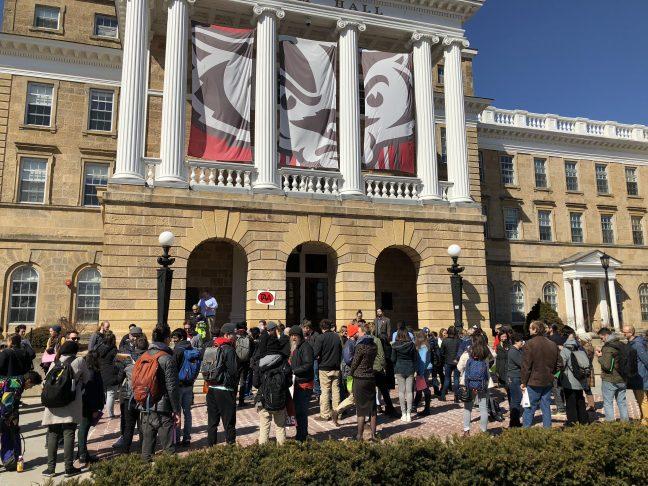A shocking video surfaced at the University of Wisconsin Monday, revealing a profoundly troubling racist incident that has left the campus community stunned and outraged. The social media video depicts a group of white students engaging in discriminatory behavior, including the use of slurs and offensive language directed at Black people and their history. Students, faculty and administration have all condemned the actions depicted in the video, which has quickly gained widespread attention.
As soon as university administrators learned of the video’s existence, they issued a statement explaining that while they could not act legally in this instance, such racist language did not reflect UW’s values of promoting inclusion. The release of this statement has enraged numerous student organizations, as they wonder how UW administration seemingly stands by while claiming to oppose racial injustice. Students want answers as to what more UW administration is doing to address racism on and off campus.
Students have expressed concerns regarding UW’s capacity to combat racism on campus in light of this incident. Numerous students have criticized the administration’s response as insufficient, arguing that it does not adequately address the root causes of racial discrimination and systemic bias.
Some have called for more concrete action, such as instituting mandatory diversity and sensitivity training for all students and employees or increasing the number of campus resources to support marginalized communities. Over 45,000 have signed a petition calling for the expulsion of the student in the video though UW has insisted they are unable to legally sanction the student for the speech. Despite the controversy, UW has not publicly announced any additional measures it will take in response to the incident, leaving many to question whether their concerns will be taken seriously.
After this disturbing revelation, student organizations such as the Wisconsin Black Student Union, the National Pan-Hellenic Council at UW–Madison, AHANA MAPS and more have taken up the mantle of activism. Many have issued statements of solidarity with the targeted minority group and demanded swift and decisive action from UW. Protests and rallies are being organized to promote unity and denounce all forms of bigotry.
One course of action UW could take is the implementation of mandatory classes on racial equality for all students. These classes can play a significant role in combating racist beliefs and attitudes on college campuses. According to Psychology in the Schools, training that increases students’ awareness of the historical nature of racism helps create a sense of commitment that is crucial to addressing racially inequitable systems.
Participants in the study added that the training influenced them by increasing their understanding and grasp of the widespread nature of structural and institutional racism, which extends beyond their immediate school context. This realization contributed to their acceptance of the fact that ongoing debates concerning racial are necessary for the correction of discriminatory policies and practices. The participants acknowledged that further conversations about these themes were necessary to address the long-standing racial inequities within their community.
By exposing students to the realities of systemic prejudice and privilege, these classes can aid in the development of a more profound understanding of the experiences of marginalized communities. They can also equip students with the vocabulary and tools necessary to recognize and combat bigotry and discrimination when they encounter it. Students can become more knowledgeable and empathetic by recognizing their biases and assumptions and engaging in meaningful dialogue. Crucially, mandatory racial equality courses can contribute to developing an inclusive and tolerant campus community that actively combats all forms of discrimination. In general, this strategy is a step in the right direction toward attaining more significant equity and justice in higher education.
Based on my own experience, the problem should be addressed from a structural perspective by introducing reforms to our educational system, most notably to its curriculum. There is a wide variety of introductory-level sociology and African American studies courses available at UW. These classes aim to educate anyone that enrolls in them, regardless of their race. But, there is a consistent lack of rigor in these classes which allows students to coast through them.
Sociology 134, “Problems of American Racial and Ethnic Minorities,” is designed to encourage racial equality and educate students about social justice. When I took it, the course was undoubtedly one of the least difficult ones I have had to take during my time in college so far, and the data backs it up. The average grade of a student in Fall 2022 was an AB. For this reason, many students enroll in social justice classes hoping to get easy As, which is the exact opposite of what they should be doing.
Conversely, other 100-level classes such as Chem 103, “General Chemistry I,” are much more challenging — the average grade for a student in Fall 2022 was a BC. Since students have to engage with the materials more, the content has the ability to have a larger impact on a student’s educational acquisition. If students took social justice classes that required them to engage with content in a similar way, they would learn more actively and have a better chance of applying their learning to contexts outside the classroom.
Additionally, the vast majority of teaching faculty and staff are white. They learned about the experiences of people of color from reading about them in books or seeing them on television. How can we expect professors who have not personally experienced racism to convey the depth and breadth of racial injustice to impart students with the knowledge they need to make change?
The racist incident at UW has highlighted the need for systemic changes on college campuses to combat racism. Frustrated with the administration’s incomplete response, student organizations have assumed an activist stance. Ultimately, it will take a collective effort from students, faculty and administration to create a campus environment where diversity is celebrated and all students feel valued and supported. If UW is ever to truly address racial inequity, it must learn to center the needs of marginalized communities.




















